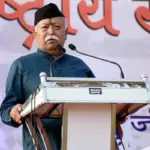Born on Pausha Krishna Saptami in 1919 (January 12, 1863 C.E. ), Narendranath Dutta, famously known as Swami Vivekananda, was raised in an Indian Bengali middle class family. Renowned around the world for introducing and serving as India’s advocate for Bharatiya (Indian) wisdom and ideals in the West. It is strongly believed that Swami ji’s philosophy and the values he upheld throughout his life, continue to serve as the fundamental source of inspiration for Indian youth. India so recognises and remembers the great philosopher and spiritual thinker by designating January 12 of each year as its “National Youth Day.”

India is one of the youngest countries in the world, with more than 65% of the population under 35 and more than 50% under 25. The teachings of Swami Vivekanand continue to inspire this energetic and vibrant segment of the population and have had a profound impact on thousands of young people’s lives. Swami Vivekanand transcended caste and creed emphasising the idea of universal brotherhood. His words accurately capture the profound impact his ideas have had on young people. A symbol of India youth’s never-ending vitality and their unrelenting search for the truth. He attained a divinity early in life as a result of his spiritual pursuits and rooting in ideas and ideals about simple living and elevation of the self. Swami ji was one of the most well-known spiritual figures, educators, and professors of Vedantic wisdom with a fresh outlook. He was a pupil of Ramakrishna Paramahamsa and revered for his unflinching bravery and inspiring words to the young.
Coming from a family of scholars, including Swami Vivekananda’s grandfather Durgacharan Dutta, who studied Sanskrit and Persian, and his father Vishwanath Dutta, who practiced as a lawyer at the Calcutta High Court. Vivekananda has been drawn to spirituality and religious thought at an early age. At the home of his neighbour in 1881, he first met his spiritual mentor Shri Ramakrishna Paramahamsa. From his master, Vivekananda gained a profound understanding of the Sanatan spiritual traditions and started to recognise the possibilities for spreading these teachings to people all over the world. Vivekananda started his journey throughout India after Paramahamsa passed away in 1886, spreading his guru’s teachings and advocating for a “practical Vedanta,” which emphasised the use of spiritual concepts in daily life. Additionally, he started to form his own ideas about the faith, the self, and the cosmos.
In his historic address to the World’s Parliament of Religions in 1893 in the United States, Vivekananda introduced Sanatan Dharma to the America and urged religious tolerance and an end to fanaticism. His speech since then, is one of the most famous in the world. An exceptional educator Vivekanand demystified Bharatiya ideals and values in both America and Europe thanks to a series of renowned speeches and talks. In his teachings, Vivekananda highlighted the value of self-realisation and the possibility of spiritual enlightenment for everyone. He also underlined the necessity of social and economic reform as well as the significance of charitable work. He held that all religions were different roads leading to the same ultimate goal and that true spirituality could be discovered through the practise of selfless service.
Swami Vivekananda played a significant role in inspiring young people by placing a strong emphasis on education and personal development. He held that a healthy and vibrant society can only be built via education, which is the key to releasing a person’s full potential. Young people were urged by him to take charge of their education and pursue greatness in all facets of their lives. Swami Vivekananda felt that people could control their own destiny and could do great things provided they were prepared to put in the necessary effort and push through any challenges in their path. He urged young people to establish high ideals for themselves and to toil diligently toward achieving them, even in the face of adversity.
According to Swami ji, serving others and improving the overall state of the world is the true goal of life. He exhorted young people to engage in volunteer work and employ their skills and abilities to benefit others. Swami Vivekananda so captures the essence of young India.


